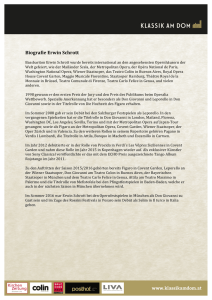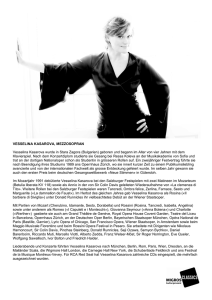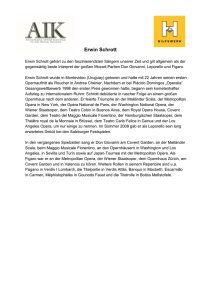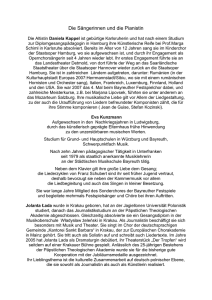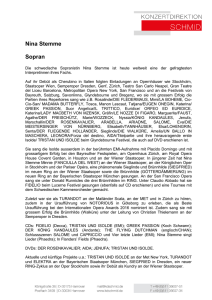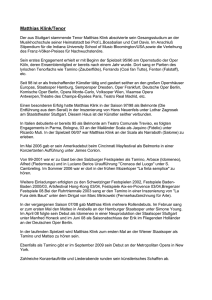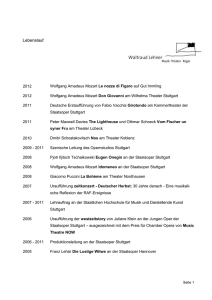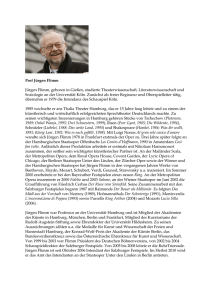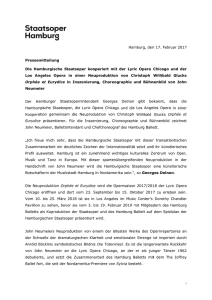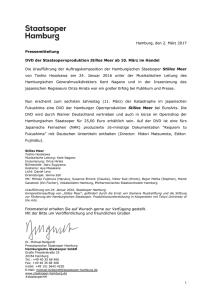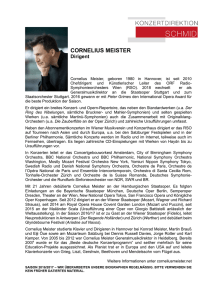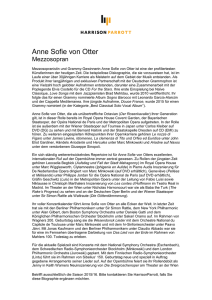Welitsch text - Preiser Records
Werbung
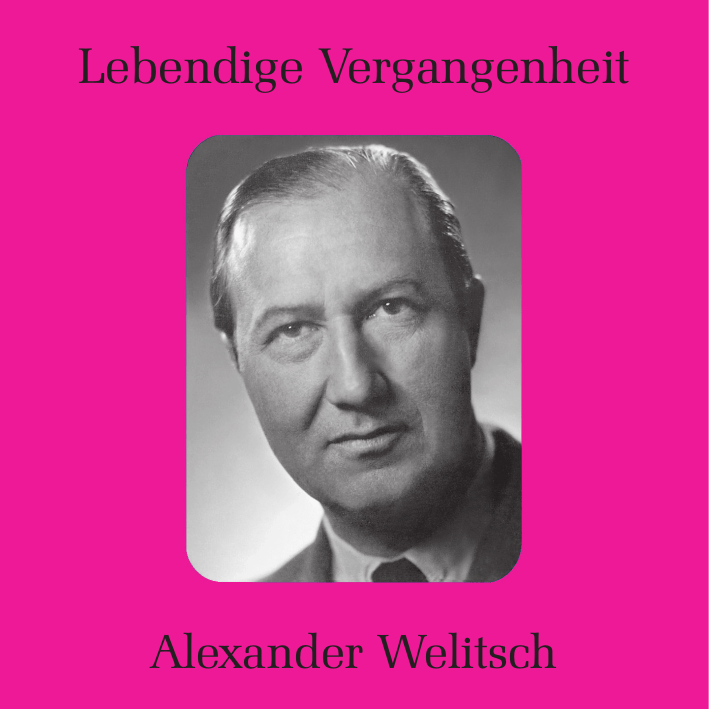
Lebendige Vergangenheit Alexander Welitsch Alexander Welitsch, langjähriger Erster Bariton der Stuttgarter Staatsoper, wurde als Alexander Asgaruh am 15. Januar 1906 in Skopje (Jugoslawien) geboren. Er studierte zunächst in seiner Heimat, kam aber dann zur weiteren Ausbildung nach Hannover. 1936 wurde er Mitglied der Stuttgarter Staatsoper und blieb in diesem Engagement bis 1941. Von 1941 bis 1942 sang er am Theater von Königsberg (Ostpreußen) und kam dann 1942 an das Opernhaus der Stadt Wien, wie die Volksoper damals hiess. Wien hatte er bereits 1940 anläßlich eines Gastspiels an der Staatsoper kennengelernt und wäre sicherlich hier heimisch geworden, wenn nicht die Totale Theatersperre diese Pläne zunichte gemacht hätte. Nach Kriegsende folgte er 1946 einem erneuten Ruf an die Staatsoper von Stuttgart, deren Mitglied er bis 1957 und als ständiger Gast noch bis 1963 war. Von Stuttgart aus gastierte er 1955 am Teatro Massimo Palermo, in Rom und Neapel und am Teatro Liceo Barcelona, an der Staatsoper von München und 1954 beim Maggio Musicale Fiorentino (als Lysiart in Webers „Euryanthe“), 1955 an der Oper von San Francisco. 1954 sang er an der Oper von Rio de Janeiro. 1951 hatte er an der Grand Opéra von Paris, 1956 an der Chicago Opera große Erfolge als Jochanaan in „Salome“. Zu seinen Glanzrollen zählten der Scarpia in „Tosca“, der Golo in „Pelleas et Melisande“, der Escamillo in „Carmen“, der Danton in „Dantons Tod“ von Gottfried von Einem und die vier Dämonen in „Hoffmanns Erzählungen“. An der Stuttgarter Oper sang er 1950 den Don Juan in der Uraufführung der Oper „Don Juan und Faust“ von Hermann Reutter. Auch aIs Konzert- und Oratoriensänger genoss er hohes Ansehen. Er war mit der Sängerin Inge Borkh verheiratet. Nach Beendigung seiner Karriere lebte er mit ihr in der Schweiz. Am 21. Oktober 1991 starb er bei einem Aufenthalt in Stuttgart. Es ist mehr als erstaunlich, dass von seiner Stimme nur eine einzige offizielle Schallplatte existiert; die große Szene zwischen Philipp II und dem Großinquisitor aus „Don Carlos“ mit seinem damaligen Volksopern-Kollegen Alois Pernerstorfer, der ebenfalls nur wenige Aufnahmen hinterlassen hat. Die Premiere in dieser Besetzung fand am 1. April 1943 statt. Die deutsche Schallplattenfirma „Telefunken“ schickte im Juli 1944 ein Aufnahmeteam nach Wien, da die Lage in Berlin immer aussichtsloser wurde, während in Wien trotz Theatersperre ein Kulturleben existierte. Anny und Hilde Konetzni waren bereits vor Ausbruch des Zweiten Weltkriegs Telefunken-Künstler gewesen. Hinzu kamen Emmy Loose, Elisabeth Höngen – auch von Elena Nicolaidi wurden Probeaufnahmen gemacht. Bei den Männern waren es Anton Dermota, Paul Schöffler, Adolf Vogel, William Wernigk, Peter Klein und Erich Kunz. Dazu kamen aus dem Volksopernensemble Georg Oeggl, Alexander Welitsch, Alois Pernerstorfer und Maria Hittorff. Dirigent dieser Aufnahmen war Erwin Baltzer, der laut Bühnenalmanach von 1944 stellvertretender musikalischer Oberleiter und Kapellmeister des Opernhauses der Stadt Wien war. Die Aufnahmen wurden sowohl nach der herkömmlichen Methode auf Wachsplatten geschnitten; parallel dazu lief aber auch ein Tonband. Bedingt durch die herrschende Materialknappheit und die immer spürbarer werdenden Kriegseinwirkungen konnten Teile dieser künstlerischen Ausbeute erst lange nach dem Kriegsende veröffentlicht werden; der überwiegende Teil blieb jedoch unveröffentlicht. Wir wissen also nicht, was von Alexander Welitsch noch aufgenommen wurde; lediglich das Terzett aus „Don Giovanni“ ist erhalten geblieben. Geblieben sind jedoch zahlreiche Rundfunkaufnahmen, die uns heute erlauben, die Bandbreite dieser Stimme zu erkennen. Alexander Welitsch, for many years the principal baritone at the Stuttgart Staatsoper, was born as Alexander Asgaruh on 15 January 1906 in Skopje (Macedonia). He began his studies in his hometown, later moving to Hanover for further training. In 1936 he became a member of the Stuttgart Staatsoper, where he remained until 1941. From 1941 to 1942 he sang at the theatre of Königsberg, Prussia (now Kaliningrad, Russia), in 1942 moving to the Opernhaus der Stadt Wien, the name of Vienna’s Volksoper in those days. He had first come to Vienna in 1940 for a guest appearance at the Staatsoper and would certainly have remained in the city if all the theatres had not been closed because of the War. When the War was over, he was summoned back to the Stuttgart Staatsoper in 1946, remaining a member until 1957 and continuing to make regular guest appearances until 1963. Using Stuttgart as a base, he also appeared in 1955 at Palermo’s Teatro Massimo, in Rome, in Naples, at Barcelona’s Teatro Liceo and the Munich Staatsoper. In 1954 he was heard at the Maggio Musicale in Florence (as Lysiart in Weber’s Euryanthe), and in 1955 at the San Francisco Opera. In 1954 he sang at the opera of Rio de Janeiro. He was highly successful as Jochanaan in Salome in 1951 at the Grand Opera of Paris and in 1956 at the Chicago Opera. Among his most brilliant roles were Scarpia in Tosca, Golo in Pelléas et Mélisande, Escamillo in Carmen, Danton in Dantons Tod by Gottfried von Einem and the four Demons in Hoffmanns Erzählungen. In 1950 he sang at the Stuttgart opera in the role of Don Juan in the première of the opera Don Juan und Faust by Hermann Reutter. He also enjoyed a fine reputation as a concert and oratorio singer. He was married to the singer Inge Borkh, and after his retirement, he lived with her in Switzerland. He died on 21 October 1991 during a visit to Stuttgart. It is truly astonishing that there is only one official record of his voice: the great scene with Philip II and the Grand Inquisitor from Don Carlo together with his colleague at the Volksoper at the time, Alois Pernerstorfer, who is also heard on very few recordings. The première with this cast took place on 1 April 1943. In July 1944, the German record label Telefunken sent a recording team to Vienna because the situation in Berlin was becoming increasingly untenable, while Vienna managed to maintain its cultural life even with the theatres closed. Anny and Hilde Konetzni had been Telefunken artists before the outbreak of the Second World War. They were joined by Emmy Loose and Elisabeth Höngen. Test recordings were also made of Elena Nicolaidi. The male singers were Anton Dermota, Paul Schöffler, Adolf Vogel, William Wernigk, Peter Klein and Erich Kunz, who were joined by Georg Oeggl, Alexander Welitsch, Alois Pernerstorfer and Maria Hittorff from the Volksoper ensemble. The conductor of these recordings was Erwin Baltzer, who according to the Bühnenalmanach (“stage almanac”) of 1944 was the musical director and conductor of the Opernhaus der Stadt Wien. The recordings were cut into wax discs (the conventional method) and also preserved in a parallel tape recording. Because of the prevailing material shortages and the increasing effects of the War, some of the recordings were not released until long after the War was over. Most of them were never issued at all. Thus we do not know what other recordings Alexander Welitsch may have made; the trio from Don Giovanni is the only one to have been preserved. However, numerous radio recordings give us a taste of the breadth and depth of his voice. MONO 89669
